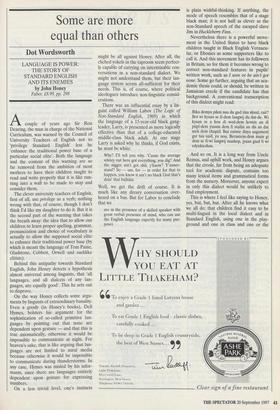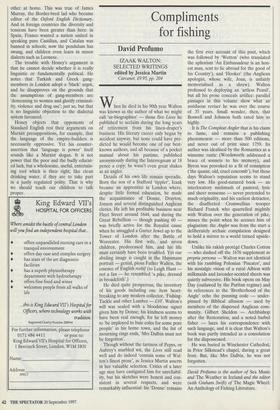Some are more equal than others
Dot Wordsworth
LANGUAGE IS POWER: THE STORY OF STANDARD ENGLISH AND ITS ENEMIES by John Honey Faber, £8.99, pp. 298 Acouple of years ago Sir Ron Dearing, the man in charge of the National Curriculum, was warned by the Council of University Teachers of English not to `privilege Standard English' lest he `enhance the traditional power base of a particular social elite'. Both the language and the content of this warning are so far removed from the ambition of most mothers to have their children taught to read and write properly that it is like run- ning into a wall to be made to stop and consider them.
The clever university teachers of English, first of all, use privilege as a verb; nothing wrong with that, of course, though I don't think I'd like my daughter to do it. But it is the second part of the warning that takes the breath away: the idea that to allow our children to learn proper spelling, grammar, pronunciation and choice of vocabulary is actually to allow the supposed social elite to enhance their traditional power base (by which is meant the language of Tom Paine, Gladstone, Cobbett, Orwell and suchlike elitists).
Behind this antipathy towards Standard English, John Honey detects a hypothesis almost universal among linguists, that 'all languages, and all dialects of any lan- guages, are equally good'. This he sets out to disprove. On the way Honey collects some argu- ments by linguists of extraordinary banality. Even a goody (in Honey's books), Dell Hymes, bolsters his argument for the sophistication of so-called primitive lan- guages by pointing out that none are dependent upon gesture — and that this is true axiomatically, otherwise it would be impossible to communicate at night. For heaven's sake, that is like arguing that lan- guages are not limited to aural media because otherwise it would be impossible to communicate during thunderstorms. In any case, Hymes was misled by his infor- mants, since there are languages entirely dependent upon gesture for expressing numbers.
On a less trivial level, one's instincts might be all against Honey. After all, the cliched yokels in the taproom seem perfect- ly capable of carrying on interminable con- versations in a non-standard dialect. We might not understand them, but their lan- guage system seems all-sufficient for their needs. This is, of course, where political ideologues introduce non-linguistic consid- erations.
There was an influential essay by a lin- guist called William Labov (The Logic of Non-Standard English, 1969) in which the language of a 15-year-old black gang- leader, Larry, is presented as more logically effective than that of a college-educated middle-class black adult. At one stage Larry is asked why he thinks, if God exists, he must be white:
Why? I'll tell you why. 'Cause the average whitey out here got everything, you dig? And the nigger ain't got shit, y'know? Y'unner- stand? So — um, for — in order for that to happen, you know it ain't no black God that's doin' that bullshit.
Well, we get the drift of course. It is much like any dreary conversation over- heard on a bus. But for Labov to conclude that we
are in the presence of a skilled speaker with great verbal presence of mind, who can use the English language expertly for many pur- poses
is plain wishful-thinking. If anything, the mode of speech resembles that of a stage black man; it is not half as clever as the non-Standard speech of the escaped slave Jim in Huckleberry Finn.
Nevertheless there is a powerful move- ment in the United States to have black children taught in Black English Vernacu- lar, or Ebonics as some supporters like to call it. And this movement has its followers in Britain, so for them it becomes wrong to correct non-standard features in pupils' written work, such as 1 seen or he ain't got none. Some go further, arguing that an aca- demic thesis could, or should, be written in Jamaican creole if the candidate has that background. A conventional transcription of this dialect might read:
Bika demya pikni naa du gud iina skuul, rait? Bot wi kyaan se fi-dem langwij du dat-de. Wi kyaan se a hou di wod-dem komin an di piipl-dem yuusin dem fi stailin an dis an dat mek dem chupid. But eniwie disya aagument gat tuu said, yu nou, Bernstein-dem main gi dem se fi-wi langwij mashop, jyaan giud fi wi edyukieshan.
And so on. It is a long way from Uncle Remus, and uphill work, and Honey argues that the creole, far from being an adequate tool for academic dispute, contains too many lexical items and grammatical forms from the nursery. Moreover, anyone expert in only this dialect would be unlikely to find employment.
This is where I feel like saying to Honey, yes, but, but, but. After all he knows what we all do: that children find it easy to be multi-lingual in the local dialect and in Standard English, using one in the play- ground and one in class and one or the other at home. This was true of James Murray, the Border-bred lad who became editor of the Oxford English Dictionary. And in foreign countries the diversity and tensions have been greater than here: in Spain, Franco wanted a nation united in speaking pure Castilian, and Catalan was banned in schools; now the pendulum has swung, and children even learn in minor dialects such as Leonese.
The trouble with Honey's argument is that he cannot decide whether it is really linguistic or fundamentally political. He notes that Turkish and Greek gang- members in London adopt a 'black' argot, and he disapproves on the grounds that the assumptions of gang-members are `demeaning to women and glorify criminal- ity, violence and drug use'; just so, but that is no linguistic objection to the dialectal system favoured.
Honey objects that opponents of Standard English rest their arguments on Marxist presuppositions, for example, that the language of the empire-builders is necessarily oppressive. Yet his counter- assertion that 'language is power' itself sounds like a Marxist slogan. It is not power that the poor and the badly educat- ed lack, but a wholesome, useful, entertain- ing tool which is their right, like clean drinking water, if they are to take part in a justly regulated polity. That is why we should teach our children to talk proper.



































































 Previous page
Previous page